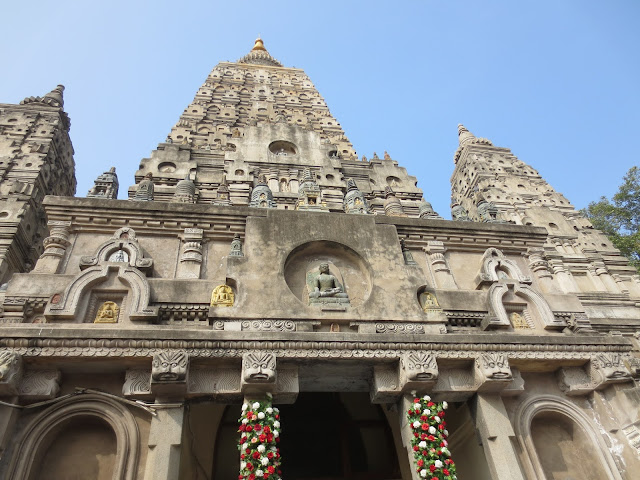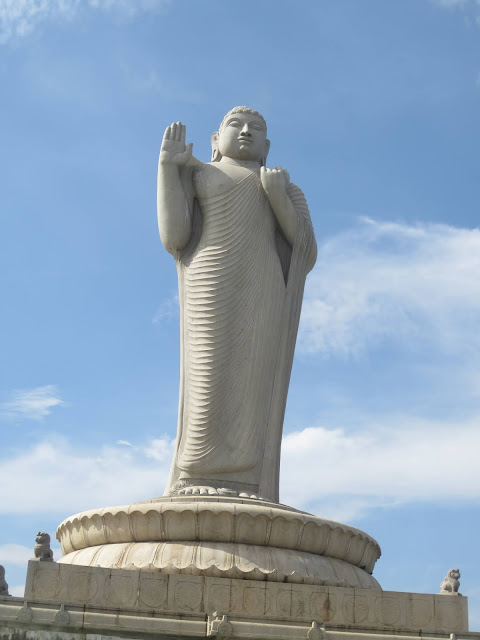Bodhgaya (India)
From my diary (January 2015)
When my time to visit
India finally arrives, I find a convenient ‘pilgrim’ flight with Thai Airways, flying
direct from Bangkok to Gaya, the small town in the state of Bihar (in eastern India)
located 12 kilometres east of Bodhgaya, the most sacred of sites for Buddhists.
The start of my actual acquaintance with India, this is to be a pilgrimage. Getting
the visa from the Indian Visa Office in Kuala Lumpur has taken both time and
money – two weeks, with three visits and much waiting, and 270 Malaysian
ringgit – but in the end, I have everything I need and take my flight to
Bangkok on 25 January.
The plane
from Bangkok to Gaya is half empty, and all of my fellow passengers are either Asian
pilgrims or Buddhist monks; not another Westerner in sight. I wonder if the series
of bombs that went off in Bodhgaya in July 2013 might be the cause of this dearth
of passengers. While a few devotees then present at the site sustained serious
injuries, the main Mahabodhi Temple itself, the Bodhi tree, and other shrines
at the site were untouched. The attack was yet another instance of the
intolerance and mindlessness of all acts of terrorism, both individual acts as
well as state-orchestrated ones (the latter also known as wars). Later, it is
confirmed for me that this year there have been fewer tourists, especially
Westerners, in spite of the heightened security measures. Around and within the
Mahabodhi, located next to the Ficus religiosa,
i.e. the Bodhi tree (or the descendant of the original tree) underneath which Siddhattha attained Buddhahood,
several
soldiers and policemen have been posted, and to enter the enclosure one now has
to go through two separate metal detectors as well as be frisk-searched
thoroughly. These measures seem sufficient to me, and the probabilities of another
attack being carried out within what is a relatively short space of time are –
if one dares say it – minimal. So, in fact, would-be tourists are avoiding
Bodhgaya just when it is probably at its safest; a classic situation which has a
negative impact through the considerable loss of jobs for those who live off tourism.
The flight
from Bangkok lasts three and a half hours, bringing us over the mountains of
Western Thailand and Myanmar – a sight to behold – until we reach the vast Gangetic
Plain. We then fly over the Ganges and parts of Bangladesh, arriving at our
final destination at 4.30 pm Malaysian time, two in the afternoon India time. Deplaning,
I feel both excitement and trepidation at being in an utterly new country, one well
known for its culture and spirituality, but also for its extreme poverty, or worse
still for the enormous gulf between the rich and the poor.
Customs
control is rather strict, and the policemen and personnel in this small airport
– which only functions as an international airport for the
Buddhist pilgrim season and is, at all other times, an unhurried domestic
airport – look
quite stern. At the exit, taxi drivers await customers, while cars and
minibuses organised in advance receive my other fellow passengers and take them
to the temples where they will be accommodated (nearly all temples here have
annexed hostels for pilgrims). I am one of the very few who has to haggle for a
passage to Bodhgaya. They name 600 rupees, a sum extortionate in local terms, and
I try to bring it down to 300, but no go. In the end, all I manage to wangle is
a feeble discount of a hundred rupees. Well, what other alternative have I? So
the taxi driver takes me to the hostel of the Bhutanese temple, at full
throttle on the narrow country road leading to Bodhgaya, brushing against
passersby, bicycles, and the ubiquitous local tuk-tuks which are here called
auto-rickshaws...
 | ||||||||||
The Mahabodhi Temple
|











Comments
Post a Comment